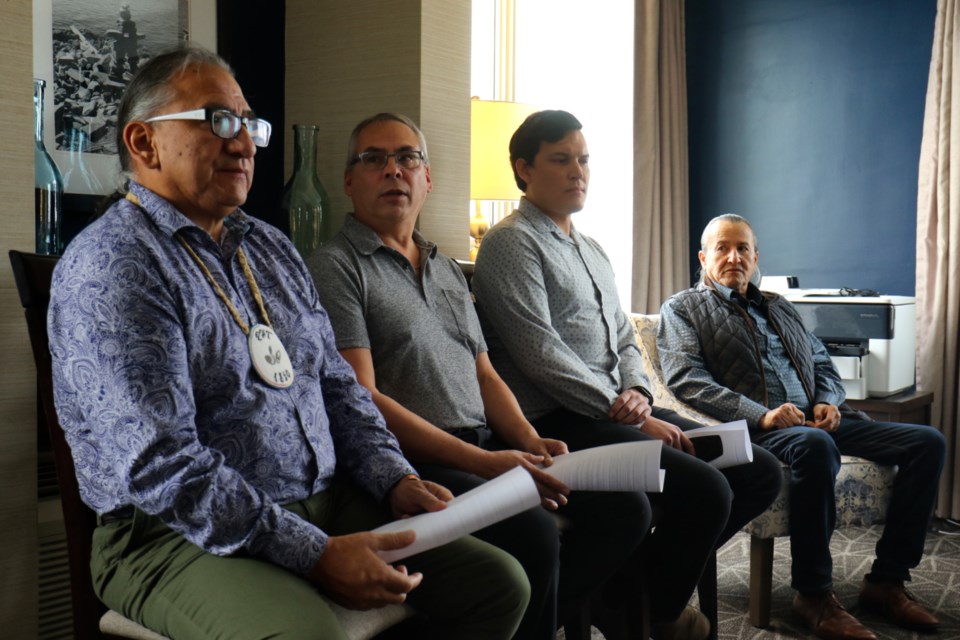Ontario Premier Doug Ford is "blowing into the wind" when he talks about driving a bulldozer into the James Bay Lowlands to launch the Ring of Fire mining project, and new tactics are needed to deal with Ford and his federal counterparts, says former Batchewana First Nation Chief Dean Sayers.
"There is a lot of value, I think, in looking outside the box that the colonial government has created for you to think from," says Sayers, who announced late last month that he's running for grand chief of the national Assembly of First Nations,
"If we keep doing the same thing that we've been doing forever, we're gonna get the same result," Sayers said during a grassroots meeting last weekend of environmental activists in Sault Ste. Marie.
"We've got to come up with new perspectives, new ideas, new plans. I think you've got to push the envelope," he told the meeting, organized by Northwatch, a regional coalition of environmental organizations, community groups and individual members in northeastern Ontario.
Sayers has been a key figure in negotiations that resulted last month in the $10-billion Robinson Huron Treaty annuities settlement.
He's running against five other candidates for AFN national chief:
- Reginald Bellerose, chair of Saskatchewan Indian Gaming Authority, and of Saskatchewan Indian Training Assessment Group
- Craig Makinaw, former chief of Ermineskin Cree Nation and former AFN Alberta regional chief
- Sheila North, former grand chief of Manitoba Keewatinowi Okimakanak
- David Pratt, vice-chief of Federation of Sovereign Indigenous Nations
- Cindy Woodhouse, AFN Manitoba regional chief
Voting is scheduled for Dec. 6 at a special chiefs assembly in Ottawa.
The following are excerpts from Sayers' remarks at the Northwatch meeting in Sault Ste. Marie:
I've been helping with protecting this area, Bawating, for a long time. Not only me, but my ancestors have been looking after this area for a very long time.
As I look and hear the First People's perspectives on the relationship, it's now legal for us to talk frankly and share the perspective that we had expected this world to look like, especially around the Great Lakes.
We don't get killed anymore. We can actually hire lawyers since the 1950s, we can actually get educated since the 1950s. And we're starting to become more aware of that.
You've got to remember that the first level of government on these lands is not the Canadian government. It's our governments. We gave life to the Canadian governments. We gave them rights. They don't give us any rights.
This particular area of Bawating, there is the strongest treaty in Canada that guides the conduct of Canada, that was designed and signed right here in Bawating, that allowed us as the original people to do what we've been in the habit of doing. Eat the way we've been able to eat, manage the forest, manage the minerals.
We were actually issuing mining permits here before Ontario and Canada were even in existence.
You've got to stop looking for the province for the truth, and for the reflection of what the Crown and our people originally agreed to.
And having the Indigenous leadership be a part of this, and feed off of and support the existing moratoriums, existing prohibitions that we've put in place for no ferrochrome, no smelter, nothing in our watershed that's going to harm our people, those kinds of foundations need to see a further life.
So if you can help with bringing those things to light, I think we're going to be a lot better off for future generations.
We are always continually in our First Nations and our leadership processes. It's not our system, it's set up for us to fail. We change leadership every other day because elections are set up that way.
But the continuation of these foundational messages are ingrained within the blood memory of our people.
So we need to have these types of engagements, and remember that they actually are the rights holders in these areas.
There are some, I guess, shared jurisdictional expectations that we've provided to the newcomers to our lands. But we still have the bulk of the decision making within our purview and within our people's leadership systems.
I've had discussions about the Ring of Fire with Premier Ford, and Premier Ford – you don't hear it – but he also knows that he doesn't have a blank cheque.
He knows that he can't just do what he wants to do, because there's so many other weights that are on him as far as what he can do and what he can't do.
And he's just blowing into the wind. He's saying he's going to jump on a bulldozer but he can't do that.
But the other thing is, those chiefs in those areas have a varying perspective on evolution and development.
I'm hearing as I travel around, we have to be reflective of the variance within the different perspectives of Indigenous leadership and how they relate according to their treaty relations.
They'll support a collective perspective on the quality of life for all of us, much like we've done here in Bawating with the ferrochrome plant.
We've said no. It's not going to happen. That was and still is the position of First Nation leadership here in Sault Ste. Marie.
We've made a declaration that Lake Superior is alive, and it has personhood value.
And they're starting to understand the limited mandate that they have, at those tables. It's not a free-for-all for them to be able to do what they like to do, because they've stolen and they're going to be called on for all of their theft.



